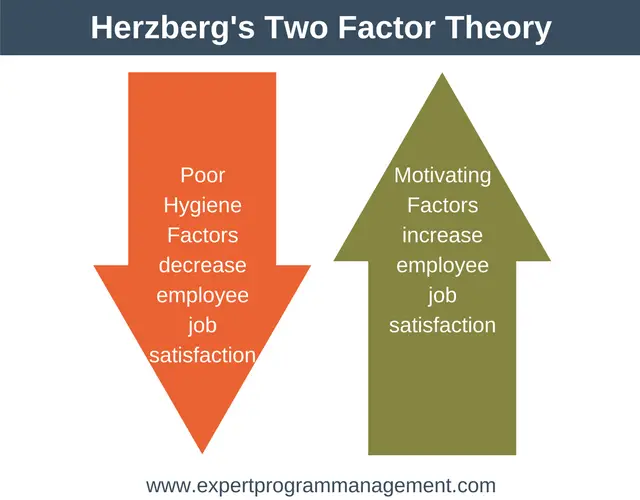Key takeaways
- Herzberg’s two-factor theory is the motivational theory that suggests that employee job satisfaction and dissatisfaction are influenced by motivating factors and hygiene factors.
- Motivating factors are factors that are intrinsically tied to the role, whereas hygiene factors are factors that are extrinsically tied to the job.
- To increase job satisfaction, managers must address motivating factors. To decrease job dissatisfaction, managers must eliminate hygiene factors
What is the two factor theory?
The two-factor theory is the belief that there are two distinct factors that either influences an employee’s job satisfaction and or dissatisfaction. These factors are called motivators and hygiene factors.
Motivating factors are characteristics that are inherent to the job. For example, the type of work and tasks that an employee performs is considered a motivating factor. Another example is the feeling of achievement an employee receives from doing their role.
Hygiene factors are factors that are extrinsically related to the role. Examples of hygiene factors include the corporate policies of the company or the salary of the role. These factors are not intrinsically tied to the role. Rather they complement the role.
One of the key insights of the theory is that employee job satisfaction and dissatisfaction do not sit on a continuum. Instead, motivating factors and hygiene factors are distinct in their abilities to influence an employee’s job satisfaction and dissatisfaction. With motivating factors, the absence of these factors does not lead to dissatisfaction and or unhappiness of an employee. However, they do impact how satisfied the employee is. Furthermore, the research finds that dissatisfaction from an employee often stems from hygiene factors. However, improving these do not necessarily lead to higher job satisfaction.
Different states of the two factor theory
With the two-factor theory, there are four states that an employee may experience.
1. High motivation and high hygiene – this is the ideal state that every organization should aim for. In this state, employees are highly motivated and contributing positively to the organization. They have minimal to no grievances with the company, allowing their efforts to focus solely on their work.
2. High motivation and low hygiene – in this state, employees may be high performers. However, they have many grievances with the organization. This is a risky area for an organization as their star performers may leave for competitors.
3. Low motivation and high hygiene – in this state, employees have few grievances about the organization. However, the work itself may not be interesting. As a result, organizations may not be getting the most out of their employees.
4. Low motivation and low hygiene – this is a dangerous state as there are no motivators for the employee and the job hygiene is poor. This can lead to employees becoming toxic in their work and even resentful.
Origins of the two factor theory
In the 1960s, Frederick Herzberg conducted a study that identified the two factor theory. He interviewed over 200 accountants and engineers in the Pittsburgh area about how satisfied they were with their careers. From there, Herzberg identified the key insight, which was that job satisfaction and dissatisfaction were not opposites of one another.
Examples of motivation and hygiene factors
Understanding motivation and hygiene factors are important for managers. This is because they are important tools for helping drive the right behaviors and outcomes from an employee.
Some examples of motivating factors include achievement, recognition, responsibility, advancement, and growth. These factors are intrinsic to the nature of the job and provide the employee an opportunity to reach fulfillment.
Hygiene factors, which are external to the role, can influence how unhappy an employee is with their role. For example, while pay can be slightly motivational, poor pay and or absence of adequate pay can make you very disgruntled with your company, even if you love what you do. Other examples of hygiene factors include job security, company policies, and work relationships.
How to decrease job dissatisfaction for employees using the two factor theory
To decrease job dissatisfaction, managers must address the hygiene factors of the job by either minimizing or eliminating them. Some practical ways that manager can do this include:
- Ensure that the compensation package (this is salary and benefits) is competitive with the industry average. Offer unique benefits that speak to the needs of your employees.
- Structure company policies to take an employee perspective to understand how it may impact the employee and how they may receive it. Tools like Moments that Matter and journey mapping can help bring insights into pain points in the employee experience.
- Implement programs, like mentorship and or socials, that give employees opportunities to build relationships with their coworkers.
How to increase job satisfaction for employees using the two factor theory
Based on Herzberg’s research, increasing job satisfaction requires managers to address motivating factors. This means having managers evaluate how they can evolve an employee’s role so that it can be more meaningful for an employee. Some ways that managers can do this are:
- Increase the autonomy of the employee’s role so they have more responsibilities and accountabilities to the outcomes of their work.
- Expand the variety of tasks, known as job enlargement, to keep employees engaged by making their role more interesting and providing opportunities to apply new skills
- Finally, increase the complexity of an employee’s role by assigning challenging tasks. This can be rewarding for the employee and help provide them a sense of achievement.
For more information on how to assess the job satisfaction of your team, check out our course on objectively assessing your team!


